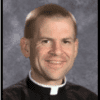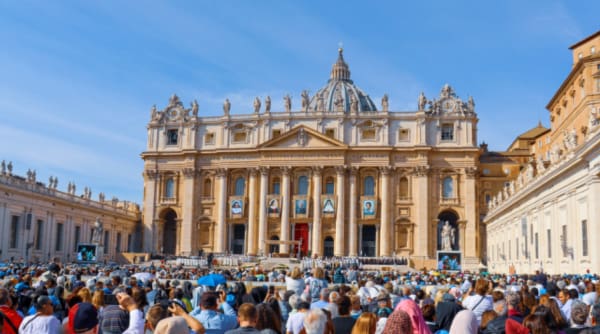On the Feast of All Saints, we rejoice in the victory that God has already won in the lives of the holy men and women who have gone before us in faith. They are now fully alive in the heavenly Body of Christ. Their triumph in Him gives us hope amidst our difficulties.
They also give us comfort and support. We are not alone in our struggle. We are united with them in love. For Christ’s Body is one.
You may recall the conversion of Paul on the road to Damascus. He heard the voice of Jesus questioning him, “Saul, Saul, why are you persecuting me?” (Acts 9:4). Not “Why are you persecuting my followers?” But “Why are you persecuting me?” Christ and his members are one. Many parts but one living body. Branches abiding on the vine. Living stones in the temple. Bride and bridegroom united as one flesh.
Paul’s encounter was not simply a one-on-one personal encounter with Jesus. It was an encounter with the whole mystical reality that is the Church. The encounter changed Paul’s life was forever. His old self died, along with his desperate striving for self-righteousness. He took on a completely new existence “in Christ” – a phrase that he went on to use 165 times in his letters! He understood our existence “in Christ” as a totally new identity, now no longer in isolation, but in an abiding communion with God and neighbor. In Romans 6 he described faith and baptism as causing us to die with Christ and rise with him to new life.
We are united in Christ in a living communion of love that far transcends the here and now. Saint Augustine offers a panoramic view of the Church as the whole Christ united in love:
“His Body is the Church, not this or that church, but the one that is spread throughout the world, not only that which exists now in the men and women of this present life, but includes also those members who existed before us and those who will exist after us – all the way to the end of the world. For the whole Church, made up of all the faithful (for all the faithful are members of Christ) has in heaven that head placed over her that guides his body. Though separated in vision, she is united as one in love.”
The Apostles’ Creed is a prayer treasured by Catholics and Protestants alike. In it, we profess our belief in the “communion of saints.” The Latin phrase is sanctorum communio, words that are delightfully ambiguous. They can mean “fellowship of holy people” as well as “sharing of holy things.” In fact, “communion of saints” means both. When one member of the Body suffers, all suffer. When one is exalted, all are exalted. Christ and his Bride are truly one flesh. They share everything together.
In our present days of darkness and division, this heavenly communion should give us great hope and encouragement. We are not alone. We are surrounded by a great “cloud of witnesses” (Hebrews 12:1). They have already conquered in Christ. They are now cheering us on as we run the race and fight the good fight.
Their triumph and their love also nurtures our deepest and holiest desires – which often lie dormant and forgotten, buried beneath the stress and chaos of our lives. Chief among those desires is the virtue of hope. Christian hope is a deep and intense longing for our true heavenly homeland.
There are many counterfeit versions of “hope” these days – political ideologies, fantasy escapes, worldly success, or the promise that technology can solve all our problems. These false hopes promise much but deliver little. They leave us disappointed, as the thing-hoped-for proves not to be the answer to our heart’s deepest questions.
True hope does not disappoint. We are destined to be perfected in the love of Christ. If we freely cooperate with his free gift, we will one day be strong enough and pure enough and holy enough to see God in the face and live. Mind you, He already loves us dearly. But we are not yet ready to receive all that love in all the ways he would love to share it. He prepares us step by step. Our capacity to receive needs to be stretched. Our desire needs to grow and grow. The more intense our longing for the Lord, the more capable we become of receiving true holiness.
Often, it is precisely through the painful trials of life that God blesses and strengthens us the most. In the moment they are cause for misery, but over time they emerge as part of a larger and beautiful story. Jesus compares the experience to a mother in labor, who finally gives birth. Paul compares it to athletes in training, with their eyes on the prize. Scripture frequently speaks of gold or silver plunged into the furnace, purified of all dross so that God’s glory can shine forth.
In this life or the next, all of us are destined to be purified by the fire of God’s love and come to shine with the saints in heaven. I have never heard that encounter described more beautifully than in the words of Pope Benedict XVI:
“…the fire which both burns and saves is Christ himself, the Judge and Savior. The encounter with him is the decisive act of judgment. Before his gaze all falsehood melts away. This encounter with Him, as it burns us, transforms and frees us, allowing us to become truly ourselves. All that we build during our lives can prove to be mere straw … and it collapses. Yet in the pain of this encounter, when the impurity and sickness of our lives become evident to us, there lies salvation. His gaze, the touch of His heart heals us through an undeniably painful transformation ‘as through fire.’ But it is a blessed pain, in which the holy power of His love sears through us like a flame, enabling us to become totally ourselves and thus totally of God.”
May we all draw inspiration from the holiness of the saints. May we be unafraid of the intensity of God’s love, which is indeed an all-consuming fire. Rather, may we be filled with true hope, abiding in God’s love until all his promises are fulfilled.




